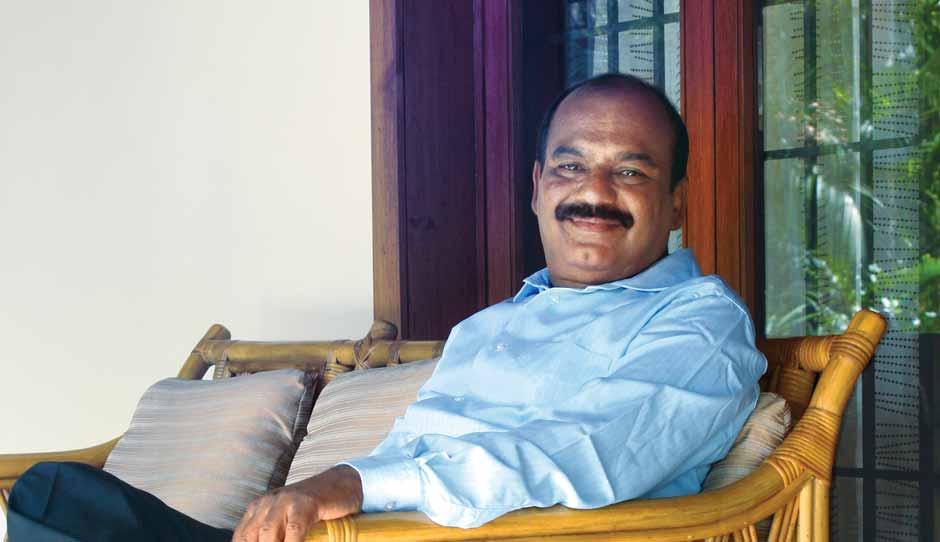The Ambition Breeder: Suguna Foods' B. Soundarajan
- BY Nikita Saxena
 In
In  23589
23589 0
0

From a small village in Tamil Nadu, B. Soundararajan and his brother have come a long way in setting up their Rs5,200-crore poultry business, Suguna Foods. It began innocuously enough with Soundararajan’s father urging him to begin a business of his own right after high school, and his mother giving him Rs5,000 as initial seed capital. Today, Suguna is a leading poultry, poultry vaccine manufacturing and poultry nutrition company. It’s also credited for popularising the concept of contract farming in Indian poultry. Suguna works with 18,000 farmers in 14 states across India, and also has operations in Bangladesh and Sri Lanka. Yet, Soundararajan says they’re only just beginning to tap the potential in the market. It’s a task he hopes his family’s next generation can now take up.
I was born and brought up in Ganapathipalayam, a small village located 70 km south of Coimbatore, Tamil Nadu. My parents used to teach in the government school in the village which had classes till high school. I studied there too. I remember cycling for five kilometres to go to school.
In 1978, when I finished class 11, my father suggested that I start something of my own. He felt that if I continued on to college, I’d graduate and get myself a safe, comfortable government job and never start something on my own. As a teacher, he knew the limited earnings a salaried job could provide and did not wish the same for me.
Since we had 20 acres of ancestral agricultural land, I decided to venture into farming. However, instead of growing cotton, a crop most villagers planted, I focused on vegetables because I wanted to do something different. My parents lent me the money to get started. For the next three years, I did vegetable farming. It wasn’t profitable. In fact, I incurred huge losses. With debt piling up, I decided to join my cousin’s agri-motor manufacturing company in Hyderabad. Her company manufactured motors in Coimbatore, and wanted to set up distribution and marketing channels in Andhra Pradesh and other states. I travelled across Andhra Pradesh and Maharashtra to sell these products. I entrusted the farm to my younger brother, G. B. Sundararajan.
In 1983, after working for three years in my cousin’s company, I cleared my debts. I returned to the village right after. By then, my brother had ideas to take our farming activities further. He wanted to venture into the poultry business. I joined him. Our mother loaned us the Rs5,000 we needed to make the chicken shelter and buy the chicks. In 1986, we began our poultry trading firm. We would buy feed from the manufacturers, chicks from the hatcheries and supply them to farmers. We did brisk business for a few years. But by the turn of the decade, the returns started diminishing. It was a sluggish market. We had an outstanding revenue of Rs8-10 lakhs but the farmers who owed us were struggling, and we could not collect much from them.
I’ve often told young students not to postpone their entrepreneurial plans. Once you get a job, you fall into a comfort zone. Don’t worry about capital. Successful businesses are created not just by money but ideas.”
The idea of contract farming began to take shape around this time. Instead of cash, we thought the farmers could repay their debts to us in service. We mapped the whole agricultural market process and found they were unable to make money because there were 14 cost centres and several middlemen who ate into their profits. Every time one more link was introduced in the process, margins dipped by five per cent. We thought we could devise a system which would reduce the cost centres from 14 to just four.
So, we launched the contract farming model with three farmers from my village. We provided farmers the feed, chicks and vaccines. They only had to invest in infrastructure. We took away 11 input costs from them, and after 40 days, we bought the chicks from them to sell in the market. This way, the farmers received a steady income every month. It took us around three years to recover the outstanding amount from the farmers.
Gradually, word got around. Other farmers saw the benefits of the model and wanted to join in. Till 1997, we continued to work this way. We made satisfactory profits but in hindsight, it was a business driven by the need to survive. Honestly, our understanding of the market was still pretty basic. We only realised the potential of the business in 1997 when the company began generating about Rs7 crore in turnover. We had 30 people on the payroll and about 35 farmers on contract. We realised that we had to bring in professional managers to help us grow further. Both my brother and I were instinctive entrepreneurs but we needed management depth if we wanted to really grow.
Hiring the right people enabled us to set up branches across Tamil Nadu. Within the next three years, our revenues jumped to Rs100 crore, and we managed to build a network of 2,000 farmers. In 2000, just as we were beginning to plan our expansion to other states, the then Andhra Pradesh Chief Minister Chandrababu Naidu took notice of us and invited us to implement the contract farming model in the state. We started from his home district of Kuppam, Chittoor, and from there, steadily added a new state or two every year. Today, we work in 15 states with 18,000 farmers.
None of this was easy, of course. Setting up in new states isn’t easy. This growth phase was one of the most difficult periods for the company. We faced a lot of resistance from middlemen in several states. But, we overcame them due to our farmers’ support.
In April 2012, Suguna Poultry was rebranded to Suguna Foods. A shift that Soundarajan sayswas inevitable as the company were moved into livestock, aquafeed and retail outlets.
When we began, the competition in the poultry business was almost next to nothing. Now, there are many small businesses emulating our model but it still isn’t intense. Competition doesn’t worry me. There is still a lot of scope in this industry, and a place for everyone to grow.
Looking back, I never imagined we would be as big as we are today. We had no mentors, business plans or risk analysis capabilities. We’ve only dreamt big and planned ahead in the last 15 years.
More than anything else, I’ll credit my parents for the confidence they showed in us. In educated, middle-class homes, families often discourage young people from starting out on their own. In the many management colleges that I’ve lectured in the past few years, I’ve often told students not to postpone their entrepreneurial plans. My father was right—once you get a job, you fall in a comfort zone. Soon enough, you get married and settle down. After this, taking a risk to give it all up to start a business isn’t easy. It’s better to jump into it early. Don’t worry about capital. Successful businesses are created not just by money but ideas.
In April 2012, we rebranded ourselves from Suguna Poultry to Suguna Foods. The shift was inevitable as we were moving into livestock and aqua feed and launching retail outlets that offer ready-to-eat meat products. We currently have 100 stores in South India. I believe there is a big market for this—future generations will not want to cook every day, nor will they have the time to do so. Also, with microwaves available in most homes, frozen products will become a consumption norm. Demand for frozen food will go up. So, poultry has become one of the divisions in the business now.
We had no mentors, business plans or risk analysis capabilities. We’ve only dreamt big and planned ahead in the last 15 years.
A major impetus in our expansion plans was the Rs110-crore investment made by International Finance Corporation (IFC), the private sector arm of World Bank in 2006. We were looking for equity groups to fund our expansion and since IFC and our wavelengths matched, we invited them to come in. It is essential that your vision matches with those investing in your company to avoid a clash of interests.
Our work involves a lot of complex, unorganised activity. A unit has to be visited every day and supplied with feeds, chicks, vaccines, etc. Every week, our technicians visit farmers to collect or deliver things. With so many levels of logistical activities taking place simultaneously, it made sense to take the help of technology. We introduced technology to increase the efficiency of our business way back in 1990.
We felt that the skill development in the poultry industry was poor. There were no dedicated poultry institutes in the country. We are about to start a poultry college in Udumalpet near Coimbatore this year. The institute will train persons who’ve completed high school with technical skills required by the industry and create the layer between farmers and marketing staff on the ground level. About 7,000 people are required in this role every year, who can manage supply of chicks, feeds, vaccines to the farmers, ensure the farmers follow all quality measures and collect the grown chicks from them. Suguna has about 5,500 technical support staff in incubation and feeding sections.
My biggest achievement has been enriching the families of our 18,000 farmers, especially because we’ve been able to give them financial stability. That means the most to me. Of course, I was thrilled when an institute like IIM Ahmedabad did a case study on Suguna Foods. But seeing a farmer’s standard of living improve because of our contribution is much more gratifying. I remember visiting Puri once where our team had arranged an interaction with 180 farmers. I met the farmers near a river under a banyan tree, and each of them had great experiences to share about how contract farming had changed their lives.
As first generation entrepreneurs, we’ve grown the company to this level. Our next generation will need to think harder about how to expand; they’ll need to concentrate on strategic areas. Till now, I haven’t felt that Suguna Foods has made it big. Yes, we’ve definitely come a long way but we are nowhere close to reaching saturation point yet. Going forward, we intend to scale up our core business beyond India, and are also evaluating new businesses in food and agriculture, which are unrelated to our core business.





























Add new comment